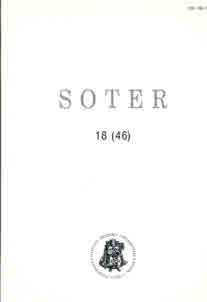Chrześcijańska wizja człowieka i filozofia myśli Juliána Maríasa
Christian vision of man and philosophy in the thinking of julian marias
Author(s): Witold DorszSubject(s): Christian Theology and Religion
Published by: Vytauto Didžiojo Universitetas
Keywords: Marías; Ortega y Gasset; chrześcijaństwo; antropologia filozoficzna; osoba ludzka; życie człowieka; dialog kultura-wiara; Marías; Ortega y Gasset; Christianity; philosophical anthropology; human person; human life; dialogue between faith and culture;
Summary/Abstract: Julian Marias (born in 1914) is one of the most significant modern Spanish philosophers. Catholic disciple of Jose Ortega y Gasset and the continuator of his philosophical project has been disregarded in certain circles of the Catholic culture due to his relationship with Ortega and his distance towards Thomism and at the same time as a result of his faith and believes which are visible in his works, and very often constitute the starting point for his philosophical reflection, he is very often numbered among, the broadly understood, Christian thinkers. The best confirmation could be the nomination to the member of the Pontifical Council for Culture that he received from John Paul II in 1982. Religion, and very specifically Christianity, had been the object of his reflection for a long time, but only the new, biographical and dramatic point of view, initiated by Marias’ decisive work Metaphisical Anthropology (1970), made possible religious formulation of the problems contemplated in philosophical manner so far. In his subsequent works the author made the use of this innovation for philosophical reflection on Christianity and to outline of the theological vision. The work of Marias shows how philosophical anthropology may adopt the unexpected horizons from the theological anthropology; the horizons which discover the unlimited capacity of the human person. The man is rational, able to see the world and God, free and responsible, he decides about his future making choices in this world as he hopes to always be in the glory of resurrection. In the face of lasting for over two hundred years the process of eliminating the religious dimension and the depersonalising of the man, the first task of Christian is religious revival of the content of faith. According to Marias the great help at this point may be the philosophy of vital reason which has overcome the relics of the Greek materialism that were the burden for theology and Christian philosophy, including the concept of the person perceived as special shape of substance or object, and discovered the meaning of human life, its personal structure, inner freedom, the pursuit of happiness, its projective character and the evidence that the death seen as annihilation would be the destruction of the hope which is the inseparable part of human life.
Journal: SOTER: religijos mokslo žurnalas
- Issue Year: 47/2006
- Issue No: 19
- Page Range: 19-26
- Page Count: 8
- Language: Polish

